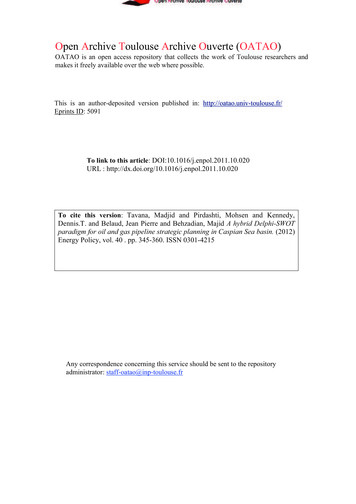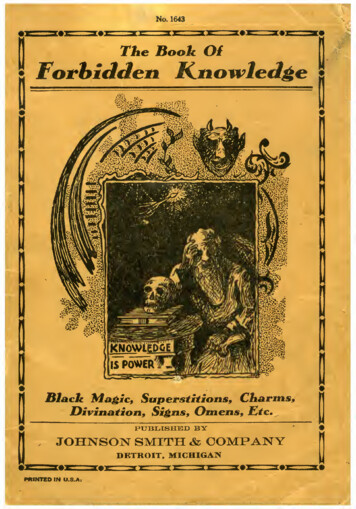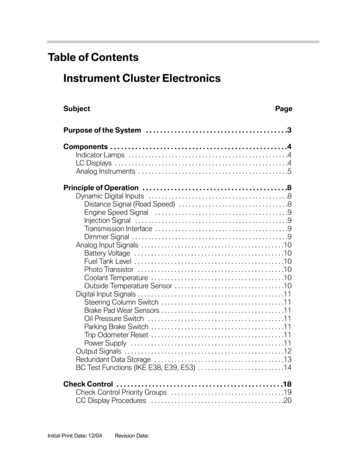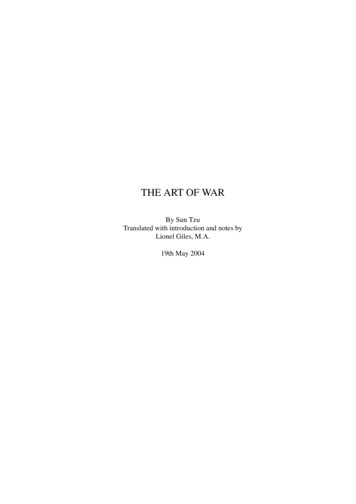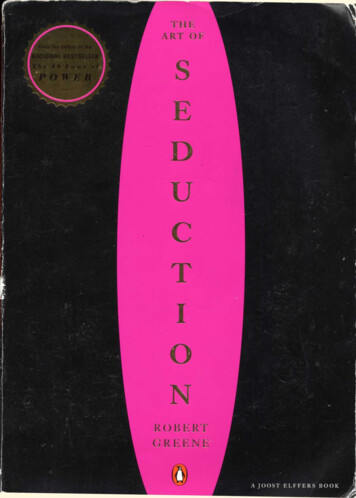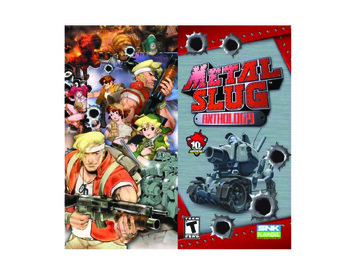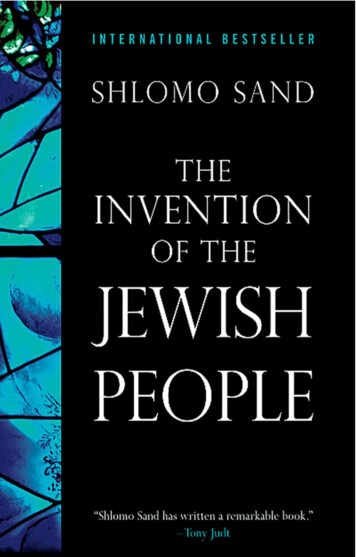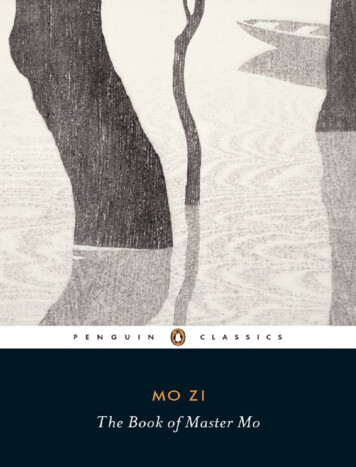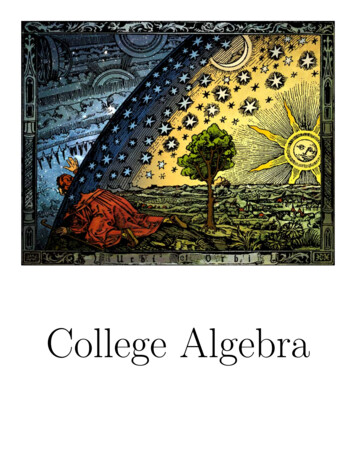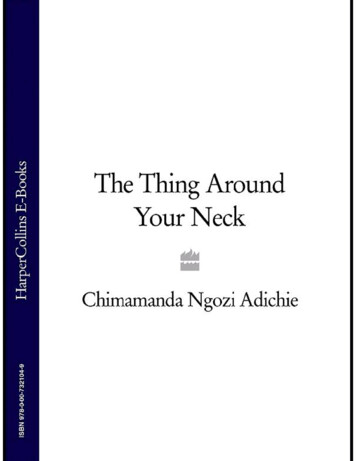
Transcription
CHIMAMANDA NGOZI ADICHIETHETHING AROUND YOUR NECK
For Ivara
ContentsTitle PageDedicationCell OneImitationA Private ExperienceGhostsOn Monday Of Last WeekJumping Monkey HillThe Thing Around Your NeckThe American EmbassyThe ShiveringThe Arrangers Of MarriageTomorrow Is Too FarThe Headstrong HistorianAcknowledgmentsAbout the AuthorAlso By Chimamanda Ngozi AdichieCopyrightAbout the Publisher
CELL ONEThe first time our house was robbed, it was our neighbor Osita who climbed in through thedining room window and stole our TV, our VCR, and the Purple Rain and Thriller videotapesmy father had brought back from America. The second time our house was robbed, it was mybrother Nnamabia who faked a break-in and stole my mother’s jewelry. It happened on a Sunday.My parents had traveled to our hometown, Mbaise, to visit our grandparents, so Nnamabia and Iwent to church alone. He drove my mother’s green Peugeot 504. We sat together in church as weusually did, but we did not nudge each other and stifle giggles about somebody’s ugly hat orthreadbare caftan, because Nnamabia left without a word after about ten minutes. He came backjust before the priest said, “The Mass is ended. Go in peace.” I was a little piqued. I imagined hehad gone off to smoke and to see some girl, since he had the car to himself for once, but he could atleast have told me where he was going. We drove home in silence and, when he parked in our longdriveway, I stopped to pluck some ixora flowers while Nnamabia unlocked the front door. I wentinside to find him standing still in the middle of the parlor.“We’ve been robbed!” he said in English.It took me a moment to understand, to take in the scattered room. Even then, I felt that there wasa theatrical quality to the way the drawers were flung open, as if it had been done by somebodywho wanted to make an impression on the discoverers. Or perhaps it was simply that I knew mybrother so well. Later, when my parents came home and neighbors began to troop in to say ndo,and to snap their fingers and heave their shoulders up and down, I sat alone in my room upstairsand realized what the queasiness in my gut was: Nnamabia had done it, I knew. My father knew,too. He pointed out that the window louvers had been slipped out from the inside, rather thanoutside (Nnamabia was really much smarter than that; perhaps he had been in a hurry to get back tochurch before Mass ended), and that the robber knew exactly where my mother’s jewelry was—theleft corner of her metal trunk. Nnamabia stared at my father with dramatic, wounded eyes and said,“I know I have caused you both terrible pain in the past, but I would never violate your trust likethis.” He spoke English, using unnecessary words like “terrible pain” and “violate,” as he alwaysdid when he was defending himself. Then he walked out through the back door and did not comehome that night. Or the next night. Or the night after. He came home two weeks later, gaunt,smelling of beer, crying, saying he was sorry and he had pawned the jewelry to the Hausa tradersin Enugu and all the money was gone.“How much did they give you for my gold?” my mother asked him. And when he told her, sheplaced both hands on her head and cried, “Oh! Oh! Chi m egbuo m! My God has killed me!” It wasas if she felt that the least he could have done was get a good price. I wanted to slap her. My fatherasked Nnamabia to write a report: how he had sold the jewelry, what he had spent the money on,with whom he had spent it. I didn’t think Nnamabia would tell the truth, and I don’t think my fatherthought he would, either, but he liked reports, my professor father, he liked things written down and
nicely documented. Besides, Nnamabia was seventeen, with a carefully tended beard. He was inthat space between secondary school and university and was too old for caning. What else couldmy father have done? After Nnamabia wrote the report, my father filed it in the steel drawer in hisstudy where he kept our school papers.“That he could hurt his mother like this” was the last thing my father said, in a mutter.But Nnamabia really hadn’t set out to hurt her. He did it because my mother’s jewelry was theonly thing of any value in the house: a lifetime’s collection of solid gold pieces. He did it, too,because other sons of professors were doing it. This was the season of thefts on our serene Nsukkacampus. Boys who had grown up watching Sesame Street, reading Enid Blyton, eating cornflakesfor breakfast, attending the university staff primary school in smartly polished brown sandals, werenow cutting through the mosquito netting of their neighbors’ windows, sliding out glass louvers,and climbing in to steal TVs and VCRs. We knew the thieves. Nsukka campus was such a smallplace—the houses sitting side by side on tree-lined streets, separated only by low hedges—that wecould not but know who was stealing. Still, when their professor parents saw one another at thestaff club or at church or at a faculty meeting, they continued to moan about riffraff from towncoming onto their sacred campus to steal.The thieving boys were the popular ones. They drove their parents’ cars in the evening, theirseats pushed back and their arms stretched out to reach the steering wheel. Osita, the neighbor whohad stolen our TV only weeks before the Nnamabia incident, was lithe and handsome in a broodingsort of way and walked with the grace of a cat. His shirts were always sharply ironed; I used tolook across the hedge and see him and close my eyes and imagine that he was walking toward me,coming to claim me as his. He never noticed me. When he stole from us, my parents did not go overto Professor Ebube’s house to ask him to ask his son to bring back our things. They said publiclythat it was riffraff from town. But they knew it was Osita. Osita was two years older thanNnamabia; most of the thieving boys were a little older than Nnamabia, and perhaps that was whyNnamabia did not steal from another person’s house. Perhaps he did not feel old enough, qualifiedenough, for anything bigger than my mother’s jewelry.Nnamabia looked just like my mother, with that honey-fair complexion, large eyes, and agenerous mouth that curved perfectly. When my mother took us to the market, traders would callout, “Hey! Madam, why did you waste your fair skin on a boy and leave the girl so dark? What is aboy doing with all this beauty?” And my mother would chuckle, as though she took a mischievousand joyful responsibility for Nnamabia’s good looks. When, at eleven, Nnamabia broke thewindow of his classroom with a stone, my mother gave him the money to replace it and did not tellmy father. When he lost some library books in class two, she told his form-mistress that ourhouseboy had stolen them. When, in class three, he left early every day to attend catechism and itturned out he never once went and so could not receive Holy Communion, she told the other parentsthat he had malaria on the examination day. When he took the key of my father’s car and pressed itinto a piece of soap that my father found before Nnamabia could take it to a locksmith, she madevague sounds about how he was just experimenting and it didn’t mean a thing. When he stole theexam questions from the study and sold them to my father’s students, she shouted at him but thentold my father that Nnamabia was sixteen, after all, and really should be given more pocket money.I don’t know whether Nnamabia felt remorse for stealing her jewelry. I could not always tellfrom my brother’s gracious, smiling face what it was he really felt. And we did not talk about it.
Even though my mother’s sisters sent her their gold earrings, even though she bought an earringand-pendant set from Mrs. Mozie, the glamorous woman who imported gold from Italy, and beganto drive to Mrs. Mozie’s house once a month to pay for it in installments, we never talked, after thatday, about Nnamabia’s stealing her jewelry. It was as if pretending that Nnamabia had not done thethings he had done would give him the opportunity to start afresh. The robbery might never havebeen mentioned again if Nnamabia had not been arrested three years later, in his third year in theuniversity, and locked up at the police station.It was the season of cults on our serene Nsukka campus. It was the time when signboards allover the university read, in bold letters, SAY NO TO CULTS . The Black Axe, the Buccaneers, and thePirates were the best known. They may once have been benign fraternities, but they had evolvedand were now called “cults”; eighteen-year-olds who had mastered the swagger of American rapvideos were undergoing secret and strange initiations that sometimes left one or two of them deadon Odim Hill. Guns and tortured loyalties and axes had become common. Cult wars had becomecommon: a boy would leer at a girl who turned out to be the girlfriend of the Capone of the BlackAxe, and that boy, as he walked to a kiosk to buy a cigarette later, would be stabbed in the thigh,and he would turn out to be a member of the Buccaneers, and so his fellow Buccaneers would go toa beer parlor and shoot the nearest Black Axe boy in the shoulder, and then the next day aBuccaneer member would be shot dead in the refectory, his body falling against aluminum bowls ofsoup, and that evening a Black Axe boy would be hacked to death in his room in a lecturer’s Boys’Quarters, his CD player splattered with blood. It was senseless. It was so abnormal that it quicklybecame normal. Girls stayed inside their hostel rooms after lectures and lecturers quivered andwhen a fly buzzed too loudly, people were afraid. So the police were called in. They sped acrosscampus in their rickety blue Peugeot 505, rusty guns poking out of the car windows, and gloweredat the students. Nnamabia came home from his lectures laughing. He thought the police would haveto do better; everyone knew the cult boys had more modern guns.My parents watched Nnamabia’s laughing face with silent concern and I knew that they, too,were wondering whether he was in a cult. Sometimes I thought he was. Cult boys were popular andNnamabia was very popular. Boys yelled out his nickname—“The Funk!”—and shook his handwhenever he passed by, and girls, especially the popular Big Chicks, hugged him for too long whenthey said hello. He went to all the parties, the tame ones on campus and the wilder ones in town,and he was the kind of ladies’ man who was also a guy’s guy, the kind who smoked a pack ofRothmans a day and was reputed to be able to finish a carton of Star beer in a sitting. Other times Ithought he was not in a cult, because he was so popular and it seemed more his style that he wouldbefriend all the different cult boys and be the enemy of none. And I was not entirely sure, either,that my brother had whatever it took—guts or insecurity—to join a cult. The only time I asked himif he was in a cult, he looked at me with surprise, his eyelashes long and thick, as if I should haveknown better than to ask, before he said, “Of course not.” I believed him. My father believed him,too. But our believing him made little difference, because he had already been arrested andaccused of belonging to a cult. He told me this—“Of course not”—on our first visit to the policestation where he was locked up.This is how it happened. On a humid Monday, four cult members waited at the campus gate andwaylaid a professor driving a red Mercedes. They pressed a gun to her head, shoved her out of the
car, and drove it to the Faculty of Engineering, where they shot three boys walking out of theirlecture halls. It was noon. I was in a class nearby, and when we heard the sharp bangs, our lecturerwas the first to run out of the room. There was loud screaming and suddenly the staircases werepacked with scrambling students unsure in which direction to run. Outside, three bodies lay on thelawn. The red Mercedes had screeched away. Many students packed hasty bags and okada driverscharged twice the usual fare to take them to the motor park. The vice chancellor announced that allevening classes were canceled and everyone had to be indoors after 9 p.m. This did not make muchsense to me, since the shooting happened in sparkling daylight, and perhaps it did not make sense toNnamabia, either, because on the first day of the curfew, he was not home at 9 p.m. and did notcome home that night. I assumed he had stayed at a friend’s; he did not always come home anyway.The next morning, a security man came to tell my parents that Nnamabia had been arrested withsome cult boys at a bar and had been taken away in a police van. My mother screamed,“Ekwuzikwana! Don’t say that!” My father calmly thanked the security man. He drove us to thepolice station in town. There, a constable chewing on a dirty pen cover said, “You mean those cultboys arrested yesterday night? They have been taken to Enugu. Very serious case! We must stopthis cult trouble once and for all!”We got back into the car and a new fear gripped us all. Nsukka—our slow, insular campus andthe slower, more insular town—was manageable; my father would know the police superintendent.But Enugu was anonymous, the state capital with the Mechanized Division of the Nigerian Armyand the police headquarters and the traffic wardens at busy intersections. It was where the policecould do what they were famed for when under pressure to produce results: kill people.The Enugu police station was in a walled-around, sprawling compound full of buildings; dusty,damaged cars were piled by the gate, near the sign that said offiCE OF THE COMMISSIONER OF POLICE.My father drove toward the rectangular bungalow at the other end of the compound. My motherbribed the two policemen at the desk with money and with jollof rice and meat, all tied up in ablack waterproof bag, and they allowed Nnamabia to come out of his cell and sit on a bench withus under an umbrella tree. Nobody asked why he stayed out that night when he knew that a curfewhad been imposed. Nobody said that the policemen were irrational to walk into a bar and arrest allthe boys drinking there, as well as the barman. Instead we listened to Nnamabia talk. He satstraddling the wooden bench, a food flask of rice and chicken in front of him, his eyes brightlyexpectant: an entertainer about to perform.“If we ran Nigeria like this cell,” he said, “we would have no problems in this country. Thingsare so organized. Our cell has a chief called General Abacha and he has a second in command.Once you come in, you have to give them some money. If you don’t, you’re in trouble.”“And did you have any money?” my mother asked.Nnamabia smiled, his face even more beautiful with a new pimple-like insect bite on hisforehead, and said in Igbo that he had slipped his money into his anus shortly after the arrest at thebar. He knew the policemen would take it if he didn’t hide it and he knew he would need it to buyhis peace in the cell. He bit into a fried drumstick and switched to English. “General Abacha wasimpressed with how I hid my money. I’ve made myself amenable to him. I praise him all the time.When the men asked all of us newcomers to hold our ears and frog-jump to their singing, he let mego after ten minutes. The others had to do it for almost thirty minutes.”
My mother hugged herself, as though she felt cold. My father said nothing, watching Nnamabiacarefully. And I imagined him, my amenable brother, rolling one-hundred-naira notes into thincigarette shapes and then slipping a hand into the back of his trousers to slide them painfully intohimself.Later, as we drove back to Nsukka, my father said, “This is what I should have done when hebroke into the house. I should have had him locked up in a cell.”My mother stared silently out of the window.“Why?” I asked.“Because this has shaken him for once. Couldn’t you see?” my father asked with a small smile. Icouldn’t see it. Not that day. Nnamabia seemed fine to me, slipping his money into his anus and all.Nnamabia’s first shock was seeing the Buccaneer sobbing. The boy was tall and tough, rumored tohave carried out one of the killings, to be in line for Capone next semester, and yet there he was inthe cell cowering and sobbing after the chief had given him a knock behind the head. Nnamabiatold me this on our visit the following day, in a voice lined with both disgust and disappointment; itwas as if he had suddenly been made to see that the Incredible Hulk was really just green paint. Hissecond shock, a few days later, was Cell One, the cell beyond his. Two policemen had carried outa swollen dead man from Cell One and stopped by Nnamabia’s cell to make sure the corpse wasseen by all.Even the chief of his cell seemed afraid of Cell One. When Nnamabia and his cell mates, thosewho could afford to buy bathing water in the plastic buckets that had once held paint, were let outto bathe in the open yard, the policemen watched them and often shouted, “Stop that or you aregoing to Cell One now!” Nnamabia had nightmares about Cell One. He could not imagine a placeworse than his cell, which was so crowded he often stood pressed against the cracked wall. Tinykwalikwata lived inside the cracks and their bites were vicious, and when he yelped his cell matescalled him Milk and Banana Boy, University Boy, Yeye Fine Boy.They were too tiny to bite so painfully, those bugs. The biting was worse during the night, whenthey all had to sleep on their sides, head to foot, except the chief with his whole back lavishly onthe floor. It was the chief who shared the plates of garri and watery soup that were pushed into thecell everyday. Each person got two mouthfuls. Nnamabia told us this during the first week. As hespoke I wondered if the bugs in the wall had bitten his face, too, or if the bumps spreading all overhis forehead had come from an infection. Some of them were tipped with pus the color of cream.He scratched at them as he said, “I had to shit in a waterproof bag today, standing up. The toiletwas too full. They flush it only on Saturdays.”His tone was histrionic. I wanted to ask him to shut up, because he was enjoying his new role asthe sufferer of indignities, and because he did not understand how lucky he was that the policemenallowed him to come out and eat our food, how stupid he’d been to stay out drinking that night, howuncertain his chances were of being released.We visited him every day of the first week. We went in my father’s old Volvo because my mother’solder Peugeot 504 was considered unsafe for trips outside Nsukka. When we passed the policecheckpoints on the road, I noticed that my parents were different—subtly so, but different. My
father no longer delivered a monologue, as soon as we were waved on, on how illiterate andcorrupt the police were. He did not bring up the day they had delayed us for an hour because herefused to bribe them, or the way they had stopped a bus in which my beautiful cousin Ogechi wastraveling and singled her out and called her a whore because she had two cell phones and askedher for so much money that she knelt on the ground in the rain begging them to let her go since herbus had already been allowed to go. My mother did not mumble, They are symptoms of a largermalaise. Instead my parents remained silent. It was as if refusing to criticize the police as usualwould somehow make Nnamabia’s freedom imminent. “Delicate” was the word the superintendentat Nsukka had used. Getting Nnamabia out anytime soon would be delicate, especially with thepolice commissioner in Enugu giving gloating, preening interviews on television about the arrestedcultists. The cult problem was serious. Big Men in Abuja were following events. Everybodywanted to appear to be doing something.The second week, I told my parents we were not going to visit Nnamabia. We did not knowhow long we would have to keep doing this and petrol was too expensive to drive three hoursevery day and it would not hurt Nnamabia to fend for himself for a day.My father looked at me, surprised, and asked, “What do you mean?” My mother eyed me up anddown and headed for the door and said nobody was begging me to come; I could sit there and donothing while my innocent brother suffered. She was walking toward the car and I ran after her, andwhen I got outside I was not sure what to do, so I picked up a stone near the ixora bush and hurledit at the windshield of the Volvo. The windshield cracked. I heard the brittle sound and saw the tinylines spreading like rays on the glass before I turned and dashed upstairs and locked myself in myroom to protect myself from my mother’s fury. I heard her shouting. I heard my father’s voice.Finally there was silence, and I did not hear the car start. Nobody went to see Nnamabia that day. Itsurprised me, this little victory.We visited him the next day. We said nothing about the windshield, although the cracks had spreadout like ripples on a frozen stream. The policeman at the desk, the pleasant dark-skinned one, askedwhy we had not come the day before; he had missed my mother’s jollof rice. I expected Nnamabiato ask, too, even to be upset, but he looked oddly sober, an expression I had not seen before. Hedid not eat all of his rice. He kept looking away, toward the cluster of half-burned cars at the endof the compound, the remnants of accidents.“What is wrong?” my mother asked, and Nnamabia began to speak almost immediately, as if hehad been waiting to be asked. His Igbo was even-toned, his voice neither rising nor falling. An oldman had been pushed into his cell the day before, a man perhaps in his mid-seventies, whitehaired, skin finely wrinkled, with the old-fashioned refinement of an incorruptible retired civilservant. His son was wanted for armed robbery, and when the police could not find the son, theydecided to lock him up instead.“The man did nothing,” Nnamabia said.“But you did nothing, too,” my mother said.Nnamabia shook his head as if she did not understand. In the following days, he was moresubdued. He spoke less, and mostly about the old man: how he had no money and could not buybathing water, how the other men made fun of him or accused him of hiding his son, how the chiefignored him, how he looked frightened and so terribly small.
“Does he know where his son is?” my mother asked.“He has not seen his son in four months,” Nnamabia said.My father said something about how it was irrelevant whether or not the man knew where hisson was.“Of course,” my mother said. “It is wrong, but this is what the police do all the time. If they donot find the person they are looking for, they will lock up his father or his mother or his relative.”My father brushed at something on his knee—an impatient gesture. He did not understand whymy mother was stating the obvious.“The man is ill,” Nnamabia said. “His hands shake and shake, even when he’s asleep.”My parents were silent. Nnamabia closed the food flask of rice and turned to my father. “I wantto give him some of this, but if I bring it into the cell General Abacha will take it.”My father went over and asked the policeman at the desk if we could be allowed to see the oldman in Nnamabia’s cell for a few minutes. The policeman was the light-skinned, acerbic one whonever said thank you when my mother handed over the rice and money bribe. Now he sneered in myfather’s face and said he could well lose his job for letting Nnamabia out and yet we were askingfor another person to be allowed out? Did we think this was a boarding school visiting day? Didn’twe know that this was a high-security holding place for criminal elements of society? My fathercame back and sat down with a sigh and Nnamabia silently scratched at his bumpy face.The next day, Nnamabia barely touched his rice. He said that the policemen had splasheddetergent water on the floor and walls of the cell in the name of cleaning as they usually did andthat the old man, who could not afford water, who had not bathed in a week, had hurried into thecell and yanked his shirt off and rubbed his frail back against the detergent-wet floor. Thepolicemen started to laugh when they saw him do this and they asked him to take all his clothes offand parade in the corridor outside the cell, and as he did they laughed louder and asked whether hisson the thief knew that papa’s penis was so shriveled. Nnamabia was staring at his yellow-orangerice as he spoke, and when he looked up I saw my brother’s eyes fill with tears—my worldlybrother—and I felt a tenderness for him that I could not have explained had I been asked to.Two days later, there was another cult attack on campus: a boy hacked another boy with an axeright in front of the music department building.“This is good,” my mother said as she and my father got ready to go and see the Nsukka policesuperintendent again. “They cannot say now that they have arrested all the cult boys.” We did notgo to Enugu that day, because my parents spent so long at the superintendent’s, but they came backwith good news. Nnamabia and the barman were to be released immediately. One of the cult boyshad become an informer, and he insisted that Nnamabia was not a member. We left earlier thanusual in the morning, without jollof rice, the sun already so hot that all the car windows weredown. My mother was jumpy on the drive. She was used to saying “Nekwa ya! Watch out!” to myfather as if he could not see the cars making dangerous turns in the other lane, but this time she didit so often that just before we got to Ninth Mile, where hawkers crowded around the car with theirtrays of okpa and boiled eggs and cashew nuts, my father stopped the car and snapped, “Just who isdriving this car, Uzoamaka?”
Inside the sprawling station compound, two policemen were flogging somebody who was lyingon the ground under the umbrella tree. At first I thought, with a lurch in my chest, that it wasNnamabia, but it was not. I knew the boy who lay on the ground, writhing and shouting with eachlash of a policeman’s koboko. He was called Aboy, and he had the grave, ugly face of a hound anddrove a Lexus on campus and was said to be a Buccaneer. I tried not to look at him as we walkedinto the station. The policeman on duty, the one with tribal marks on his cheeks who always said“God bless you” when he took his bribe, looked away when he saw us. Prickly hives spread overmy skin. I knew then that something was wrong. My parents gave him the note from thesuperintendent. The policeman did not look at it. He knew about the release order, he told myfather, the bar man had already been released but there was a complication with the boy. Mymother began to shout. “The boy? What do you mean? Where is my son?”The policeman got up. “I will call my senior to explain to you.”My mother rushed at him and pulled at his shirt. “Where is my son? Where is my son?” Myfather pried her away and the policeman brushed at his shirt, as if she had left some dirt there,before he turned to walk away.“Where is our son?” my father asked in a voice so quiet, so steely, that the policeman stopped.“They took him away, sir,” he said.“They took him away?” my mother broke in. She was still shouting. “What are you saying?Have you killed my son? Have you killed my son?”“Where is he?” my father asked again in the same quiet voice. “Where is our son?”“My senior said I should call him when you come,” the policeman said, and this time he turnedand hurried through a door.It was after he left that I felt chilled by fear, that I wanted to run after him and like my motherpull at his shirt until he produced Nnamabia. The senior policeman came out and I searched hiscompletely blank face for an expression.“Good day, sir,” he said to my father.“Where is our son?” my father asked. My mother was breathing noisily. Later I would realizethat at that moment each of us suspected privately that Nnamabia had been killed by trigger-happypolicemen and that this man’s job was to find the best lie to tell us about how he had died.“No problem, sir. It is just that we transferred him. I will take you there right away.” There wassomething nervous about the policeman; his face remained blank but he did not meet my father’seyes.“Transferred him?”“We got the release order this morning, but he had already been transferred. We don’t havepetrol, so I was waiting for you to come so that we go together to where he is.”“Where is he?”“Another site. I will take you there.”“Why was he transferred?”“I was not here, sir. They said he misbehaved yesterday and they took him to Cell One and thenthere was a transfer of all the people in Cell One to another site.”“He misbehaved? What do you mean?”“I was not here, sir.”My mother spoke then in a broken voice. “Take me to my son! Take me to my son right now!”
I sat in the back with the policeman. He smelled of the kind of old camphor that seemed to lastforever in my mother’s trunk. We did not speak except for his giving my father directions until wearrived about fifteen minutes later, my father driving inordinately fast, as fast as my heart wasbeating. The small compound looked neglected, with patches of overgrown grass, with old bottlesand plastic bags and paper strewn everywhere. The policeman hardly waited for my father to stopthe car before he opened the door and hurried out, and again I felt chilled by fear. We were in thispart of town with untarred roads and there had been no sign that said Police Station and there was astillness in the air, a strange deserted feeling. But the policeman came out with Nnamabia. There hewas, my handsome brother, walking toward us, unchanged, it seemed, until he came close enoughfor my mother to hug him and I saw him wince and back away; his left arm was covered in softlooking welts. Dried blood was caked around his nose.“Nna-Boy, why did they beat you like this?” my mother asked him. She turned to the policeman.“Why did you people do this to my son?”The man shrugged, a new insolence to his demeanor; it was as if he had been uncertain aboutN
common: a boy would leer at a girl who turned out to be the girlfriend of the Capone of the Black Axe, and that boy, as he walked to a kiosk to buy a cigarette later, would be stabbed in the thigh, and he would turn out to be a member of
